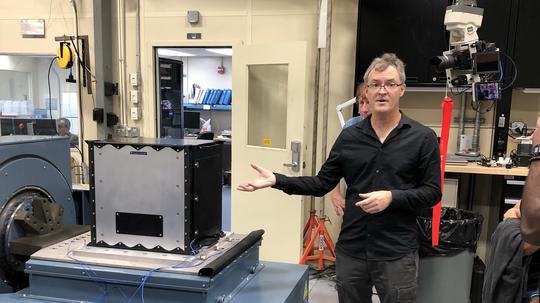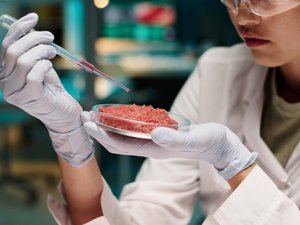
A professor at Carthage College has been awarded a $500,000 grant from NASA to help develop critical technology as the space organization eyes a lunar return in 2024.
Kevin Crosby, a professor of physics and astronomy, will use the funds to guide space science students as the college continues to advance its Modal Propellant Gauging (MPG) solution. The technology uses acoustic vibrations to measure the amount of fuel left in a spacecraft tank, a critical metric that has been identified as a billion-dollar-a-year problem for the space agency.
It’s also the same technology Carthage College has tested on previous suborbital flights, including its most recent launch — aboard the Blue Origin’s New Shepard rocket, earlier this month.
This latest grant funds MPG technology research geared for NASA’s new lunar exploration program. Known as Artemis — the twin sister of Apollo and goddess of the Moon — the international effort aims to send the first woman, and the next man, to the Moon’s surface sometime within the decade. The project is also widely considered a testing ground for the agency’s aspirations to send humans to Mars.
The last time a person walked the moon was in 1972.
“We are developing a new and powerful approach to solve a problem that has been around since the Apollo era,” Crosby said in a press release from the university. “It’s a hard problem because liquids in space behave in strange ways that we’re just beginning to understand.”
MPG technology has two primary application areas: in long-term orbital assets, such as with satellites used for weather, cable, and other communications; and in spacecraft like the rockets and spacecraft proposed for Artemis.
Their “lifetimes” are measured in dollars, Crosby explains in a phone call. Without knowing how much fuel is present in the tanks, the crafts are decommissioned with roughly 10-15 percent of their fuel leftover to err on the side of caution.
The grant and task at hand represent a “major step up” in terms of the complexity of the MPG technology Carthage is working to develop, he said.
“The Artemis program calls for propellants that have never been used in deep space missions,” said Crosby. “Getting accurate measurements will be critical to both a mission’s safety and success. Even a 1 percent improvement in our ability to measure propellant translates into hundreds of pounds of additional materials we can bring to the moon, and right now, MPG is one of only a few viable approaches to deep space fuel gauging.”








